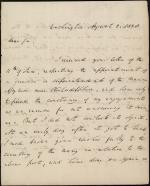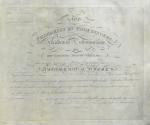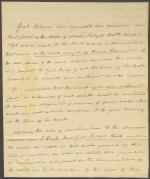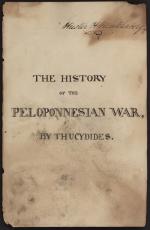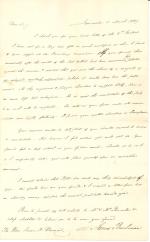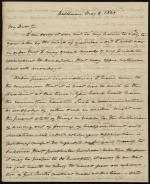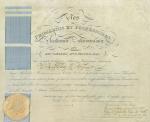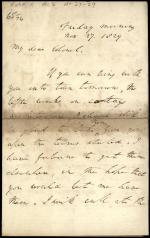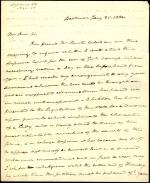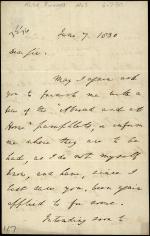About Full-Text Documents
Collections of college and personal papers, as well as a select number of individual documents, have been briefly described in entries available for browsing and searching on this site. All collection and document descriptions contain a representative image and a summary of the contents.
Search Document Descriptions
Browse Document Descriptions
February 4, 1828
John McLean, United States Postmaster, writes William Murphy, the Postmaster of Maysville, Kentucky, to remind him of the obligation to deliver letters on Sunday that "arrive on Saturday night." "Please conform to [this rule] and render the office as accommodating as possible to all persons having occasion to use it as a medium of correspondence," as McLean explains.
Format: Letters/Correspondence
Location: I-Purchase-1973-1
Subject: Business and Industry, Politics and Government
Time Period: 1820-1839
View Item: Letter from John McLean to William Murphy
April 16, 1828
Representative James Buchanan writes Joseph Gales and William Seaton to complain about being misquoted in a newspaper article. "I never expressed such an opinion" on imports, as Buchanan notes. Buchanan also asks them to publish a correction. Transcript included.
Format: Letters/Correspondence
Location: MC 1998.10, B1, F8
Subject: Business and Industry, Economics and Finance, Politics and Government
Time Period: 1820-1839
View Item: Letter from James Buchanan to Joseph Gales and William Seaton
May 14, 1828
Maryland Attorney General Roger Brooke Taney writes to Arthur Shaaff, an attorney in Georgia, to share news about his family as well as discus legal and political issues. Taney notes that his two daughters, along with Shaaff's friends, are in Georgetown for Rebecca Key's wedding. In addition, Taney explains the status of a bond and explains why a lawsuit might be necessary. In addition, Taney advises Shaaff against returning to Maryland to "resume the profession of the law in [Maryland]."
Taney also responds to Shaaff's question about the "prospects" of Andrew Jackson in the 1828 Presidential election. "We do not doubt his success," as Taney notes. Taney also notes that Henry Clay "has been here electioneering" in Baltimore and explains that "his visit and speech will not add to his strength." Transcript included.
Format: Letters/Correspondence
Location: I-SpahrB-undated-40
Subject: Economics and Finance, Legal Affairs, Personal and Family Life, Politics and Government
Time Period: 1820-1839
View Item: Letter from Roger B. Taney to Arthur Shaaff
May 22, 1828
Maryland Attorney General Roger Brooke Taney writes to Beal Randall of the Mutual Insurance Company of Baltimore regarding a settlement. Transcript included.
Format: Letters/Correspondence
Location: I-AsbellY-2004-8
Subject: Economics and Finance, Legal Affairs
Time Period: 1820-1839
View Item: Letter from Roger B. Taney to Beal Randall
July 1828
The Dickinson College catalog for the 1827-1828 academic year. Through the years, the annual catalog was variously titled "The Bulletin," "Catalogue and Register," "Course Catalog," and similar variants. The catalog typically includes the list of courses offered, requirements for enrollment, requirements for graduation, tuition and other fees, and campus facilities, college policies, and lists of teaching faculty, college trustees, and various administrators.
Format: Books and Pamphlets
Location: Dickinsoniana Periodicals
Subject: Dickinson College Academic Affairs, Dickinson College Administration, Education
Time Period: 1820-1839
View Item: Catalogue of the Officers & Students of Dickinson College, 1827-28
August 2, 1828
Richard Rush responds to John F. Watson's request for assistance in obtaining an "appointment as governor or superintendent of the Marine Assylum near Philadelphia." Rush explains that he talked to Secretary of the Navy Samuel L. Southard, who noted that it was likely "that a naval officer will be selected for it." Transcript included.
Format: Letters/Correspondence
Location: I-YoungH-1959-1
Subject: Military Affairs and Conflict, Politics and Government
Time Period: 1820-1839
View Item: Letter from Richard Rush to John F. Watson
September 15, 1828
Augustus Otto Hiester receives his Bachelor of Arts Diploma from Dickinson College on September 15, 1828.
Format: Certificates and Diplomas
Location: Diploma Collection
Subject: Education
Time Period: 1820-1839
View Item: Bachelor of Arts Diploma - Augustus Hiester
October 7, 1828
Maryland Attorney General Roger Brooke Taney's writes this interpretation of Charles Ridgely' will in regard to the "land bought of Henry Darnall." Taney provides his opinion on this matter at the request of General Ridgely, who had inherited the land in question from Charles Ridgely. Transcript included.
Format: Legal and Government Documents
Location: I-SpahrB-1961-2
Subject: Land and Real Estate, Legal Affairs
Time Period: 1820-1839
View Item: Legal Opinion of Roger B. Taney on Charles Ridgely's Will
December 8, 1828
Maryland Attorney General Roger Brooke Taney writes Arthur Shaaff, an attorney in Georgia, to offer advice about seeking an office in President-Elect Andrew Jackson's administration. "While nobody can undertake to say what course Genl. Jackson will take," Taney notes that Jackson's "friends hope and believe that he will cleanse the offices" of the federal government. Taney believes that this action will almost certainly take place because many current government "clerks" have been "lauding Messrs [President John Q.] Adams and [Secretary of State Henry] Clay" over the past four years. Transcript included.
Format: Letters/Correspondence
Location: I-SpahrB-undated-40
Subject: Personal and Family Life, Politics and Government
Time Period: 1820-1839
View Item: Letter from Roger B. Taney to Arthur Shaaff
1829-1830
The first portion of Hiester Muhlenberg's notebook while a student at Dickinson College consists of synopses of each book in Thucydides' "The History of the Peloponnesian War."
Hiester Muhlenberg's notebook consists of synopses of each book in Thucydides' "The History of the Peloponnesian War" as well as in-depth notes on the text. Muhlenberg's notes also include references to specific pages in Thucydides' text.
Muhlenberg also wrote several journal entries in the notebook. On March 6, 1829 Muhlenberg explained how he was forced to abandon his studies and return home due to an illness. In the following entry on March 6, 1830, Muhlenberg stated his knowledge of his impending death, a confession of his sins, and prayed that God will save his soul. Muhlenberg, a member of the class of 1829, created this notebook as a student at Dickinson College.
Format: Diaries and Journals, Notes and Notebooks
Location: I-HarrisonB-1959-1
Subject: Dickinson College Academic Affairs, Dickinson College Student Life, Education, Health and Medicine
Time Period: 1820-1839
View Item:
1829
James King Davison, a member of the Class of 1829, receives this diploma as a member of the Belles Lettres Society in 1829.
Format: Certificates and Diplomas
Location: Diploma Collection
Subject: Education
Time Period: 1820-1839
January 6, 1829
United States Treasury Secretary Richard Rush writes to Joseph B. Manning stating that he has forwarded Manning's letter and enclosed $30 to the Department of State, "to which the subject of patents belongs."
Format: Letters/Correspondence
Location: I-BeachW-1974-4
Subject: Business and Industry, Politics and Government
Time Period: 1820-1839
View Item: Letter from Richard Rush to Joseph Manning
February 7, 1829
Representative James Buchanan writes a letter from Washington, DC, and discusses several political issues in Pennsylvania, including the 1829 Gubernatorial election. Buchanan describes Isaac Barnard, a possible candidate for governor, as "a high minded, independent honest man" who will never "become the tool of any man." Transcript included.
Format: Legal and Government Documents
Location: MC 1998.10, B1, F9
Subject: Politics and Government
Time Period: 1820-1839
March - August 1829
Representative James Buchanan writes two letters to Senator Isaac D. Barnard to discuss political matters as well as console him for his defeat at the Harrisburg Convention. Transcripts included.
Format: Letters/Correspondence
Location: MC 1998.10
Subject: Personal and Family Life, Politics and Government
Time Period: 1820-1839
March 30, 1829
Maryland Attorney General of Roger Brooke Taney writes to Secretary of the Navy John Branch and recommends Mr. William M. Wood for a surgeon's mate appointment in the U.S. Navy. Taney describes Wood as "a young man of excellent talents," even though Taney admits that he has "no personal acquaintance with Mr. Wood."
Format: Letters/Correspondence
Location: I-SpahrB-1965-14
Subject: Military Affairs and Conflict
Time Period: 1820-1839
View Item: Letter from Roger B. Taney to John Branch
May 8, 1829
Maryland Attorney General Roger Brooke Taney (Class of 1795) discusses President Andrew Jackson, Treasury Secretary Samuel D. Ingham, and party politics.
Format: Letters/Correspondence
Location: I-Friends-2000-1
Subject: Politics and Government
Time Period: 1820-1839
May 22, 1829
Maryland Attorney General Roger Brooke Taney writes interpretation of the will of A. Riddle of London. "Mr. Abercrombie is not entitled either to the legacy of £1000, nor to the share of the residence[?] bequeathed to his wife," as Taney concludes.
Format: Legal and Government Documents
Location: I-SpahrB-1960-3
Subject: Land and Real Estate, Legal Affairs
Time Period: 1820-1839
View Item: I-SpahrB-1960-3.pdf
June 20, 1829
Statesman Richard Rush writes to an unspecified Colonel, requesting papers on behalf of the Treasury Department and returning works the Colonel has already sent.
Format: Letters/Correspondence
Location: I-BeachW-1983-5
Subject: Politics and Government
Time Period: 1820-1839
September 23, 1829
Charles Francis Himes receives his Bachelor of Arts Diploma from Dickinson College on September 23, 1829.
Format: Certificates and Diplomas
Location: OC 2000.1, F3
Subject: Education
Time Period: 1820-1839
View Item: Bachelor of Arts Diploma - Charles Himes
November 27, 1829
Diplomat and politician Richard Rush writes Colonel Thomas Aspinwall and requests several books on cottage architecture. Rush also describes his schedule before a trip to London.
Format: Letters/Correspondence
Location: I-Friends-1976-6
Subject: Travel and Tourism
Time Period: 1820-1839
View Item: Letter from Richard Rush to Thomas Aspinwall
January 18 ; February 19, 1830
Representative James Buchanan writes two letters to Colonel Isaac Wayne and shares political news, explains why midshipmen cannot be appointed, as well as speculates on possible candidates for the 1832 Presidential election. The politicians that Buchanan mentions include incumbent President Andrew Jackson, Vice President John C. Calhoun, and Secretary of State Martin Van Buren. Buchanan also reminds Wayne that "my political speculations in regard to Calhoun & Van Buren are confidential." Transcripts included.
Format: Letters/Correspondence
Location: MC 1998.10
Subject: Military Affairs and Conflict, Native Americans, Politics and Government
Time Period: 1820-1839
View Item: Letters from James Buchanan to Isaac Wayne
January 25, 1830
Maryland Attorney General Roger Brooke Taney writes to lawyer Richard S. Coxe, explaining that in order to appear before the Maryland legislature to defend a client in a divorce case, Coxe must defer a decision about attending the Supreme Court for the case of General Van Ness.
Format: Letters/Correspondence
Location: I-BonisteelR-1954-2
Subject: Legal Affairs, Politics and Government
Time Period: 1820-1839
View Item: Letter from Roger B. Taney to Richard Coxe
February 10, 1830
Representative James Buchanan writes to Peter Stephen Du Ponceau of Philadelphia about Du Ponceau's earlier letter, which Buchanan had delivered to Ambrose Spencer, the chairman of the Committee on Agriculture. Buchanan explains that "[Spencer] justly appreciates the services which you have rendered to the country, by the information you have obtained & communicated to the public, in relation to the preparation of raw silk." Buchanan also had delivered a copy of Du Ponceau's "Essays on American Silk." Transcript included.
Format: Letters/Correspondence
Location: I-Friends-2006-3
Subject: Business and Industry, Politics and Government
Time Period: 1820-1839
June 7, 1830
Richard Rush writes to an unspecified Mr. Force requesting a few "Abroad and at Home" pamphlets. Rush also wanted to settle any outstanding debts with Force before he left Washington. Transcript included.
Format: Letters/Correspondence
Location: I-Friends-1976-7
Subject: Economics and Finance, Literary Pursuits
Time Period: 1820-1839
View Item: Letter from Richard Rush to Mr. Force
September 5, 1830
Professor Charles Dexter Cleveland writes to Alexander Nisbet regarding his feelings for Nisbet's niece, Miss Alison McCoskry. " Almost at our very first meeting I found myself agitated by feelings that I never before had experienced," as Cleveland explains. Cleveland also expresses concern over plans as to where they will move. While "Mr. and Mrs. Mason desires that she and I should go to New York," Cleveland notes that this "would not do for her" because "the climate is by far too cold and damp for one of her constitution." Cleveland suggests Baltimore, as a suitable alternative. Transcript included
Format: Letters/Correspondence
Location: I-ClevelandR-1978-1
Subject: Health and Medicine, Personal and Family Life, Weather and Climate
Time Period: 1820-1839
View Item: Letter from Charles Cleveland to Alexander Nisbet






